#informationoverload
Note
How do you feel about the desensitization social media has about tragedy and how this affects our brains? I’ve studied media and communication and I’m super passionate about this topic.
The other day I was scrolling on Youtube shorts, and I saw a girl post a video about the air quality in new york due to the wildfires in Canada. The video was satire/comedy and she sped her video up while prancing around lip singing to yellow by coldplay or something. (Side note: why do people even find these sped up videos funny? They’re annoying)
I’m just wondering if you have an opinion on how desensitized people have become. Like at first glance I was like Oh that’s a bit funny! And then I caught myself and was like hang on this really happened as is currently affecting others… that’s horrible. I’ll scroll on my snapchat news and see murder case / true crime headings reading like fun little blurbs. And people do their makeup and profit off other peoples trauma for views like they’re professionals doing it and it’s so insulting. The list really goes ON.
Do you think some studies will start coming out soon about how our empathy levels are incredibly low or even developing our brains differently because of social media’s impact on empathy and being desensitized to so many things?
Sorry for the loaded question! I’m curious to see what you think.
Thank you for this question because I've been thinking about it for like, three days straight. At first I was inclined to be like, "well, no, I think the internet is fine and our worries about empathy are just a moral panic that we see with every new technology that's developed." And then I was inclined to be like, "people have definitely become less empathetic lately, and the internet is probably a big part of that." But I think the reality is that the internet is kind of neutral. More than anything, the internet is a tool that acts to magnify and intensify the way people already are. Some people use the internet to become more aware of other people and understand their unique situations; other people use it to be trolls.
The first thing I want to talk about here is the idea that people used to be more empathetic in the past. I just don't know if that's actually true. Blood sports- games in which people are violent towards one another on purpose as a form of entertainment- have existed for most of human history. Gladiator combat in Ancient Rome is a relatively popular example of this, and often ended in the death of a gladiator. Boxing is a sport that has historically been popular and continues to be popular to this day, despite the fact that it's just two people violently attacking one another. Lynchings used to be public spectacles, where the attendants often treated these as festive events, with food, family photos, and souvenirs. I don't know that I believe we were really more empathetic in the past at all. I think we've actually really improved on the "you can't torture, maim, or kill other people or animals for entertainment" front, especially since those types of things are generally banned from social media.
And like I was saying before, I do genuinely think that the internet can foster greater understanding and empathy towards marginalized groups. I know the struggles of all sorts of groups that I might never encounter in real life. I know how to be polite to people from a variety of different cultures that I might never experience. I've been posed with some really challenging philosophical questions through the content I've been exposed to online. I'm hearing the narratives of marginalized groups that I may have never otherwise heard, and I'm hearing it in their own words. That's incredibly valuable, and I think people who have grown up in the internet age don't fully appreciate how historically rare that actually is. Up until now, history has been written by the victors, the powerful, the oppressors. Now that narrative is democratized and widely available. That's huge in terms of its ability to build empathy and understanding if we choose to be open to it.
But, that same democratization can create problems. The first is that there's not really a distinction between in-group and out-group content anymore. It used to be that there was kind of a sense of, "well, I can say that about my own [group/family/situation] to people who understand, but you can't say that, because you're not part of it and you don't get it." People create content with their in-group in mind, but it often "breaches containment"- it's seen by people who aren't in that in-group. People who are living in New York and making jokes about the air quality situation in New York are usually making those jokes for other people in New York who are in their same situation. They're trying to lighten the mood of something scary. But the people who are seeing it aren't necessarily in New York; they're all over the world, and the context and emotional intention of that joke is kind of lost. There's an implicit assumption in these videos that you're starting from a place of understanding how horrible it is because you're living it, but that's often not true of the actual viewers. In your case, you saw a funny video and thought it was funny. If you had seen a serious video about the same situation, you probably would have been like, "oh shit, this is serious. I hope the people are okay." It's not necessarily a lack of empathy here but a lack of shared context in the way the information is being presented (or something like that?)
That brings us to problem two, which is compassion fatigue. More than ever before in history, we are constantly aware of every bad thing that has happened everywhere in the world, every single day. It used to be that you would get the newspaper and it would be focused mostly on local news, with some national headlines and a couple international headlines that were really important. The information we had about bad things that were happening were mostly things we could do something about. But now, that's not really the case, right? Today, I know that the Jenin refugee camp suffered massive damage following the Israeli army's biggest assault there in 20 years. I know the Palestinians fear that the situation will escalate. I know that Allison Mack, who ran the Nxivm cult, was released from prison after serving just two years of her sentence. I know that a suspect in a Philadelphia shooting was charged with the murder of five people, and that a Canadian man is facing terrorism charges over far-right videos, and that Japan has announced a controversial plan to release treated waste water from the Fukushima nuclear plant, and that Senegal has been facing a crisis because their President, Macky Sall, was threatening not to step down after the end of his second term, and that France is protesting police violence because a police officer shot and killed a French-Algerian teenager. And I can't do anything about any of this. I just know about it, and I have to care about it because I know about it.
And we've created this weird ecosystem online where everyone feels like they need to issue a PR type statement about whatever sociopolitical thing the internet cares about in the moment to show that they're a good person who is informed, even if they don't have a significant following and aren't impacted by the issue at hand. All of us are doing a weird kind of brand management for a brand that's just our own self, and we're managing it for the sake of our friends and family because we feel like we have to. And any time a person with a significant following does publish one of those statements, inevitably there are people badgering them about why they haven't spoken on the issue that they care about that's happening in their country. I just don't think that we as people have the emotional capacity to process that much information or care about that many things, especially when they're situations that we can't really do anything about, and especially when that situation will be replaced with something new within a few days. I think that's one of the reasons so many people feel helpless and disempowered right now. There's too much to fix but no real way for us to do it, especially in the time scale the internet provides.
So in this sense, I don't think that we're lacking empathy so much as we're required to be so empathetic that we've exhausted our capacity for it. There are more demands put upon us to be empathetic than ever before, and so we reach those moments of compassion fatigue more than ever before.
The other thing that I think is worth talking about here is the way in which the internet prioritizes extremes. The goal of algorithms is generally to get people to stay on the website longer, and the easiest way to do that is by getting them to feel a strong emotion. That's why clickbait works. It's also why the internet is invested in creating so much outrage. And the easiest way to continue getting people to feel outraged is to show them increasingly outrageous things, whether or not they're true. The internet kind of got 4chanified- like teenagers on 4chan, social media algorithms and article headline writers are trying to out-do one another by recommending or posting the most outrageous thing they can in order to capture the attention economy.
This is the part that concerns me the most with regards to the internet in general. Famously, Facebook’s negligence facilitated the genocide of Rohingya Muslims in Myanmar after its algorithms amplified hate speech and Facebook failed to remove the inflammatory posts. Outrage = views = money for Facebook = more outrage bait being pushed = in the most extreme cases, genocide. And also, outrage = views = money for Facebook = more outrage bait being pushed = Donald Trump getting elected in the US. Outrage = views = money for Facebook = more outrage bait being pushed = people believing misinformation about medicine. And I think that creates a kind of interesting dynamic when it comes to empathy. Because in some sense, these people are very empathetic- they're outraged because of their empathy. They read a (fake) story about a child being victimized by a pediophilic trans teacher (or whatever) and panic because they have empathy for the children that they believe were victims. They're anti-immigration because they have empathy for the people who (they believe are) losing their jobs to immigrants. In the case of the Rohingya genocide, the Buddhist majority in Myanmar had empathy for the individuals that they believed were victimized by the Rohingya for their religious beliefs. These people were all wrong, but they're not lacking empathy. They're making a decision that an outside group isn't worthy of empathy because they've committed such heinous crimes. And that's a tale as old as time; just ask anyone who's Jewish.
I think what we need to be worried about is the ways in which the internet, and especially social media, can platform and expedite that process on a level that hasn't really been seen before. After the 2016 election, I used to really believe that we just needed to sit down with people across the aisle and have a civil, empathetic, rational conversation about the issues. But now I think that if that was ever possible, the time for it has passed. Misinformation, disinformation, and sensationalized information have become so rampant online that there's not really any way to have those discussions anymore because there's no way to agree on what is and isn't true. And unless we change something really quickly, that problem is just going to get worse with the advent of deepfake technologies and AI bots.
I feel like I've said a lot here but I haven't really come to any conclusions... but those are some of my thoughts, at least. I guess maybe it's that humans have always kind of sucked at being empathetic to people who are part of an out-group, but now we're just doing it on a global scale and reacting to threats that are (perceived to be) larger than ever before? Maybe it's that we should focus on strengthening and bettering our local communities as much as possible, and contributing on a global scale when we can? Maybe it's that media literacy is important, and we should always interact with news articles critically, even if they seem like they're a credible source?
#InternetEmpathy#VirtualNarratives#EmpathyThroughTechnology#DigitalDemocratization#SharedContextChallenge#CompassionFatigue#InformationOverload#OnlineOutrage#AttentionEconomy#SocialMediaImpacts#media literacy#cultural criticism#cultural critique
13 notes
·
View notes
Text
⭐LEARN FROM YOUR MISTAKES⭐
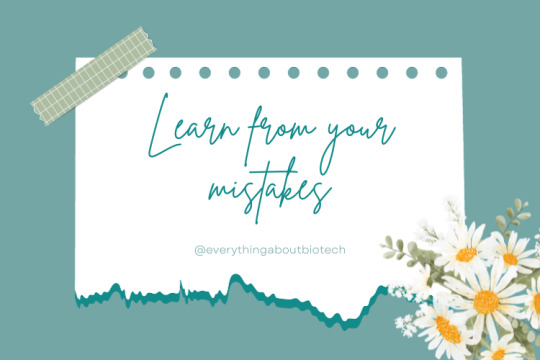
Oscar Wilde famously said that experience is just another name for the mistakes we make. This rings true, as long as we learn from those mistakes. In today's increasingly unpredictable world of constant change, information overload, multiculturalism, and technological disruption, mistakes are inevitable.
Most people dislike making errors, but management expert Tom Peters argues in his book Thriving on Chaos that we can't afford perfectionism. The quickest way to find solutions is through rapid testing, making mistakes, learning, and adjusting. He advocates that we embrace and even celebrate mistakes as opportunities for growth. He thinks we should become "mistake maniacs".
⭐Happy accidents⭐
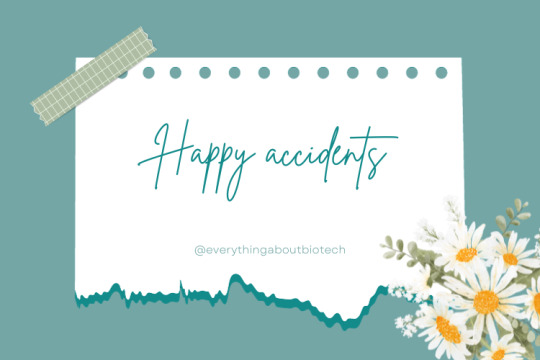
It's worth remembering that many discoveries and inventions have happened by accident. In the early 1970s, Arthur Fry wanted a bookmark for his church hymnal that wouldn't fall out or damage the pages. His colleague at 3M, Spencer Silver, had developed an adhesive that wasn't strong enough to stick two surfaces together (as planned) but left no residue after removal and allowed items to be repositioned. Fry put some of Silver's adhesive along the edge of a piece of paper. His church hymnal problem was solved, and the Post-it note was invented.
Viagra was originally developed to treat cardio-vascular problems. In testing, it must have become (very) clear that it wasn't just the heart that was affected.
And the famous inventor Thomas Edison made thousands of failed prototypes of his electric light bulb before finally succeeding. When asked why he hadn't given up, he explained that each failure had taught him something he needed to know for the next attempt. Edison was clearly a mistake maniac.
⭐Turn mistakes into experience⭐

1. Accept the mistake
When you make a mistake, admit it as soon as you can first to yourself and then to others. The sooner you accept that a mistake has happened, and take responsibility for it, the sooner you can start learning from it.
2. Analyse and get feedback
Study where you went wrong, so you'll know what to do differently next time. It can help you in identifying solutions to future problems, too. It's helpful to get feedback from trusted colleagues. A mentor can give you advice on how they've managed similar situations.
3. Find the lesson to be learned
Keep a diary. Record your mistake along with your analysis and the feedback you received. Then, make a plan with specific steps to prevent the same mistake from happening again.
Some organizations have online mistake diaries that everyone can contribute to, in which mistakes and their solutions are posted.
4. Check your learning progress
Use a simple learning checklist at regular intervals to help you learn from these experiences.
5. Always be a learner
Develop a learning mindset and be prepared to take some risks. Prioritize where you want to develop, concentrating on one thing at a time. Put time aside for your learning. Share your goals with someone you trust, so they can encourage and support you. A mistake maniac is ultimately a lifelong learner.
⭐Essential phrases⭐

1. Accept the mistake
I'm afraid that was my fault.
My approach to the problem was wrong.
I'm sorry but I messed up there.
2. Analyse and get feedback
Let's see what went wrong in the process.
I think I understand where I made an error.
Where do you think the mistake was made?
3. Find the lesson to be learned
I can see where I need to improve.
I've made an action plan to make sure this doesn't happen again.
I don't intend to make the same mistake twice.
4. Check your learning progress
Have I reached my learning goals?
I carry out a self-check on my progress at regular intervals.
I need to check whether my approach is working.
5. Always be a learner
One step at a time.
Have a look and tell me if
you think these goals are practical.
I've allocated time each week for learning.
⭐My learning checklist⭐
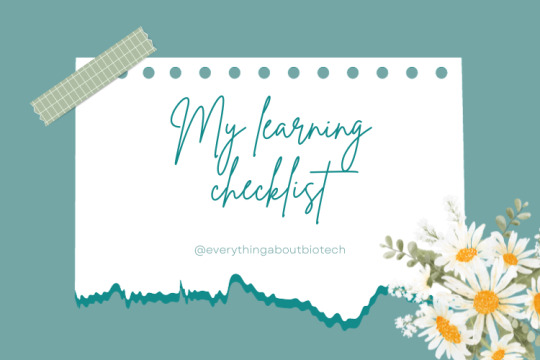
Answer YES or NO:
Have I...
reached the learning goals I wanted to reach by this time?
clarified my learning targets for the next six months?
taken steps to improve how I manage my time for learning?
thought about things I haven't enjoyed doing and/or have not done well and considered how?
I might handle such things in the future?
thought about things I have enjoyed doing and/or have done well?
done anything specific to keep up to date?
concentrated on how to improve in the future?
learned something new about myself?
Follow @everythingaboutbiotech for more informative and useful posts.
.
.
Source: Business Spotlight
#LearnFromMistakes#GrowthMindset#TrialAndError#IterateAndImprove#EmbraceMistakes#NoPerfectPath#ComplexWorld#ConstantChange#InformationOverload#MulticulturalWorld#TechnologicalDisruption#CelebrateFailures#FailForward#ProgressNotPerfection#LessonsLearned#SelfImprovement#OpportunitiesInErrors#EvolutionThroughMistakes#TestAndAdjust#ForwardMotion#ExperienceOverAvoidance#RiskAndReward
5 notes
·
View notes
Photo
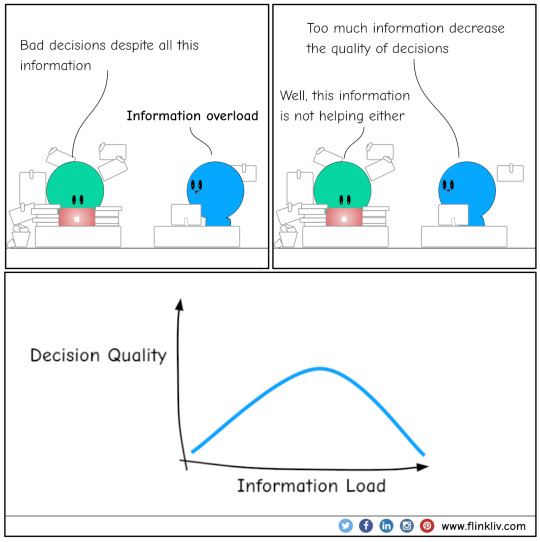
Information overload is a serious state that diminishes your ability to make decisions.
#RStats#decisionmaking#criticalthinking#kritisktenkning#beslutningstaking#DataScientist#a11y#flinkliv#informationoverload#formyeinformasjon#rstudio#Rbloggers#CodingLife
2 notes
·
View notes
Text
Stressed Out Due To The Information Overload PT.10
It’s rough out here due to these information overloads even though it’s a blessing to be here on this Thankful Thursday!
Throwback Thursday energy is also recognized as we deal with this Mercury retrograde in Aries so who’s being fair with those and these / so who’ll work with me?
Digital Crate Digging Continues along with dropping this good word / writing poems aka sketching dreams before…
View On WordPress
#ArtificialIntelligence#darkmysteryoftimeandspace#digitalcratedigging#djmixes#informationoverload#MercuryRetrogradeInAries#ojsimpson#poetry#ThankfulThursday
0 notes
Link
Join us on "Ask Mom and Dad" to gain a fresh perspective on life, faith, and the search for truth.
**Section 1 - "Rediscovering Faith over Knowledge"**:
Join us as we delve into why parents today are increasingly obsessed with knowledge and education for their children. Are we overemphasizing the wrong things? Mom and Dad express their concern and discuss how placing the fear of the Lord at the center of life can guide us to wisdom, knowledge, and truth. The message is clear: Faith is more important than mere information.
**Section 2 - "Suffocating in an Information-Soaked World"**:
Information overload! We live in a world filled with constant advertisements and data. Mom and Dad will explain the suffocating effect of too much information, like a smog in a city, and why it's essential to find moments of stillness amid the chaos to hear the truth. Learn how to cut through the clutter and discover the reality that lies beneath the surface.
**Section 3 - "Intimate Relationship with Truth"**:
Mom and Dad explore the intimate connection between knowing truth and having a deep relationship with Jesus. They dive into the role of faith, truth, and relationships in navigating a world flooded with information. In a world where right and wrong can blur, find out why a solid foundation in faith is your compass to discerning the truth.
Subscribe today to "Ask Mom and Dad" and remember, faith, not knowledge, is the key to unlocking the truth. Don't miss out on this incredible podcast journey! 🌟🙏 #AskMomAndDadPodcast
#askmomanddad#deeperunderstanding#discoveringfaith#faithjourney#faithoverknowledge#findingstillness#godswisdom#informationoverload#intimatetruth#knowledgevstruth#lifeguidance#navigatinglife#podcastinspiration#podcasttalk#podcastwisdom#searchingforanswers#spiritualpodcast#truthinchaos#truthseekers#wisdomandfaith
0 notes
Text
#%23SummarizeTech#SummarizeTech#InformationOverload#DigitalLiteracy#ProductivityTips#TechSolutions#DataSummarization#InformationManagement#KnowledgeOrganization#UnlockYourPotential#StayInformed#DataSimplification#TechTools#EfficientLearning#InfoOverload#MaximizeProductivity#SmartTech#SummarizationGuide#InfoManagement#StayFocused#InformationPrioritization
0 notes
Text
In a world of opinions, I'm just here with the facts.
.
.

#.#FactCheck#KnowledgeNuggets#DidYouKnow#InfoBlast#FactualFriday#LearnEveryday#MindBlown#EducateYourself#FunFacts#InformationOverload#FactFile#WisdomWednesday#Enlightenment#DiscoverMore#FactOfTheDay#InfoHub#IntellectualInsights#ShareTheKnowledge#LearnAndGrow#SmartFacts#FactExploration#KnowledgeSharing#InformedDecisions#FactfulContent
0 notes
Text
Are you a blogger or marketer in search of fresh ideas for content creation? Look no further!

Puzzlax is here to be your go-to source for creating a winning content strategy from scratch. We consider your goals, platforms, target audience, and other crucial factors to help you stand out. 📝✅
We get it—finding the right information can be a challenge. 🤯 But fear not! Puzzlax is here to guide you through the noise. 🗣️ One of the main obstacles you face on the path to your goals is the abundance of incomplete, contradictory, and low-value information out there. By relying on it, you risk delaying the achievement of your desired results. It's time for a change! 💥
Join us on this transformative journey, and watch everything turn around. ✨💡 Puzzlax is your trusted companion, equipped with the expertise to help you overcome these obstacles and unlock your true potential. Together, we'll navigate through the content creation landscape with confidence. 💪🚀
Say goodbye to information overload, and say hello to focused, impactful content creation. 🙌 Join Puzzlax today, and let us help you turn your ideas into compelling content that captivates your audience and drives tangible results. Together, we'll make your mark in the digital world. 🎯
#contentcreationideas#bloggerlife#marketer#Puzzlax#contentstrategy#goals#platforms#targetaudience#obstacles#informationoverload#desiredresults#contentinspiration#digitalmarketing#socialmediamarketing#bloggingtips#contentplanning#creativeideas#marketingstrategies#contentmanagement#contentdevelopment#bloggingcommunity#marketinginsights#successmindset#contentoptimization#contentcreationtools#digitaltransformation#innovation
0 notes
Text

This morning my husband was busy making coffee in the kitchen and he went to the fridge to get the milk. Next thing I hear “Honey, where’s the milk? I swear we opened a new one yesterday. Surely we didn’t go through a whole liter in one day?”.
I quickly went to the kitchen to rescue the situation, opened the fridge and there the milk was, staring right back at me. I quickly grabbed it and gave it to him “Here you go”.
Husband: “Where did you find it?”
Me: “In the fridge, top shelf, right in front”.
Husband: (looks at me in total disbelief).
I’m sure I’m not the only one that this has happened to. Sound familiar?
Many times, we cannot see the things that are staring right at us – the solution to a problem, an opportunity we’ve been waiting for, etc. Why is this?
One could use the old adage “too close to the project”. Yes, that’s true – but there’s so much more to consider.
Reason 1 – You’re way too stressed
It’s amazing the effect that stress has on you. It causes sleeping and eating pattern changes, loss of focus, physiological effects, etc.
What this means is that you may struggle to focus and you will miss the opportunities that may lie in front of your eyes because you’re too focused on the source of your stress.
Lesson: learn to manage your stress levels so that they don’t affect your progress in life.
Reason 2 – There’s too much going on
Modern life is really really busy and the pandemic has not helped at all. Most of us who have jobs are doing more than one person’s work and those of us who do not have jobs have so much going on just trying to survive.
It is a well-known fact that we are exposed to more information in one day than our grandparents were in their entire lives. And our “FOMO” (fear of missing out) drives us to know as much as possible just in case we might need that tidbit of information at a later stage.
Lesson: de-clutter your activities and stop being busy being busy
Reason 3 – You’re way too distracted
There are so many things that can distract us in modern life. That series on Netflix, that pesky game on your mobile phone. Oh, and don’t forget social media.
Take a step back – do you really need all that distraction in your life? I doubt it. I’m not saying cut it out all together – rather, pay attention to how much time you spend on these activities and trim it down so that you have more time to do something productive.
Lesson: limit your time on digital distraction and be disciplined about it.
Reason 4 – You don’t believe that there is a solution
You have no idea how common this is. Most people can’t see the opportunities that lie in front of them because they don’t believe that they deserve them and they don’t believe that they can find a solution to improve their lives.
Limiting beliefs are holding people back from achieving amazing things! We are all filled with inner magic and most of us cannot see our own potential.
Lesson: work on eradicating your limiting beliefs.
CONCLUSION
Make a commitment to yourself today to work on the lessons learnt from this article. You are amazing! If you clear your mind from the clutter, de-stress, eliminate distraction and work on your limiting beliefs, you can accomplish amazing things and will find the solutions you are looking for.
Go for it – what are you waiting for?
Here’s something to think about:
“When you give yourself the gift of some morning peace away from your busyness, the hardwired capacity of every human brain to access the realm of pure genius becomes activated.” – Robin Sharma, The 5AM Club
#MorningCoffee#KitchenMoments#MilkDilemma#FridgeFails#RescueMission#NotSeeingTheObvious#StressManagement#BusyLife#InformationOverload#DigitalDistractions#LimitingBeliefs#UnlockYourPotential#ClearYourMind#DeStress#EliminateDistractions#BelieveInYourself#AmazingPossibilities#SolutionsInSight#MorningPeace#PureGenius#The5AMClub#RobinSharmaQuotes
0 notes
Text
The Art of Working Smarter, Not Harder: Work Efficiency
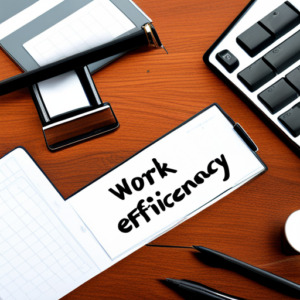

WORK EFFICIENCY
Getting things done quickly and effectively is more prized than ever in today's competitive corporate world. Increasing productivity, decreasing expenses, and maintaining competitiveness have made work efficiency a priority for many firms. This in-depth manual will explore the numerous facets of work efficiency, including its significance, real-world examples, the role of workers, and various tactics and instruments for improvement.
Learning to Maximize Work Efficiency
Just what does it mean to be efficient at work?
Efficiency in the workplace is achieving goals while spending the least time, money, and energy possible. The goal is to increase production as much as possible without lowering standards. A productive workplace is one in which workers can carry out their duties promptly with little interruptions and waste.
The Current Economic Climate and the Value of Effective Work Practices
In today's competitive market, it is essential to maximize each working minute. It helps companies get the most out of their resources, boost their bottom line, and provide their customers more for their money. Workers who can do their work without feeling rushed or overwhelmed are more likely to be satisfied.
Effectiveness in the Workplace vs.The Essential Variations and Interactions
While the terms are sometimes interchangeable, "efficiency" and "productivity" differ. Manufacturing more goods per worker hour is an example of increased productivity. One must minimize the inputs needed to produce a specified result to maximize productivity.
However, these ideas are intrinsically linked to one another. Productivity can rise if workers complete the same tasks in less time. On the flip side, efficiency is frequently a byproduct of a productive workplace because of the effective use of resources to achieve the intended results.
Case Studies of Effectiveness in the Workplace
Implementing Efficiency: Real-World Examples
Several companies have improved their operations by using efficient methods. Toyota, a Japanese automaker, is well-known for its "Toyota Production System," which aims to reduce inefficiencies and boost output. The widespread popularity of this method has led to its adoption by a wide range of comREAD Mastering the Art of Business: A Comprehensive Guide to Improve Operational EfficiencyPowered by Inline Related Postspanies.
The Amazon online store is another such. Amazon has used many efficient methods to streamline its operations, from its highly automated warehouses to its sophisticated transportation network. Amazon has thrived in the cutthroat e-commerce sector thanks in part to the steps mentioned above, which expedite and streamline product delivery for customers.
What Does Work Efficiency Mean for the Bottom Line?
These instances show how efficiency may lead to financial gains for a company. Businesses may increase value for their consumers and save expenses by adopting efficiency strategies. It can give them an edge in the market and boost their chances of long-term success.
Employee Contributions to Productivity in the Workplace
How effective is an employee in their job duties?
Work efficiency is the ratio of output to input for a worker. Depending on the task, it may be quantified in terms of production per hour. If you work in customer service, you may use the number of daily inquiries answered as a metric.
An efficient worker completes their work quickly and accurately without wasting materials or time. They can set priorities, organize their job efficiently, and maximize their time and resources.
Employee Contributions to Organizational Effectiveness
The effectiveness of a company depends on its workforce. Their efficiency and output directly affect the bottom line. They may recommend alterations to current methods, aid in detecting and removing waste, and adopt productive routines. Businesses may foster a culture of continual improvement and reach new heights in efficiency.
Ability to Get Things Done Quickly
Whether or not work efficiency is an honorable ability remains open. Though some may claim it is more of a state of mind, others insist it is a right talent that only requires time and effort to develop.
No matter what side of the argument you're on, it's undeniable that some abilities boost productivity on the job. Skills such as time management, prioritizing, problem-solving, and remaining calm under pressure fall under this category. Workers may increase their productivity and help the company by honing these abilities.
Methods for Getting More Done in Less Time
Learn how to maximize your time and effort in several different settings. Efficiency and productivity are common topics in corporate education. These tools can help illuminate inefficiencies and teach you how to fix them.
Learning through doing is another option. You may improve your productivity and work habits by routinely testing your ability to execute things more quickly and effectively. Getting input from superiors and coworkers can help you pinpoint problem areas and monitor your development.
Effective Leadership Methods for Increasing Work Efficiency
Leaders' Impact on Increasing Work Efficiency at Work
Leaders in organizations have a significant impact on boosting productivity. They determine the company's culture, chart its course, and foster an environment conducive to productivity.
There are many methods by which leaders improve productivity. They can establish transparent norms and objectives, furnish the required means, and encourage a mindset of constant growth and development. They can also inspire those around them to improve their productivity by showing them the way.
Strategies for Efficient Leadership to Increase Work Efficiency
Improving productivity is possible via the application of several leadership tactics. Enhancing processes is one option. Leaders may make a massive impact on productivity by rooting out and fixing the sources of inefficiency in their organizations.
Empowering workers is another tactic. Leaders may increase productivity by offering workers more autonomy and responsibility in decision-making and problem-solving through delegated authority and access to appropriate resources.
Leaders may now leverage technological advances to boost productivity. Leaders may automate mundane operations, simplify procedures, and increase productivity by equipping their teams with cutting-edge software and hardware.
Methods and Equipment for Increasing Work Efficiency

work efficiency
The Effect of Technology on Work Efficiency
The use of digital technologies has dramatically improved productivity. They've helped automate mundane operations, simplify procedures, and free up staff time so that they can get more done.
Project management technologies, for instance, can improve the planning, tracking, and administration of projects by groups of people. Communication technologies can boost productivity by reducing the need for face-to-face meetings and lengthy talks. Using data analytics technologies may help business executives get valuable insights into their company's performance, allowing them to make better decisions and spot areas for growth.
Techniques and Instruments for Streamlining Task Management
Improving productivity relies heavily on streamlined task management. Managing one's time, energy, and material possessions wisely is a part of this.
Multiple methods and applications exist to facilitate effective project administration. One standard method for setting priorities is the Eisenhower Matrix, which ranks tasks according to importance. A time-blocking strategy involves allocating discrete chunks of time to individual activities.
Various software and mobile apps are designed specifically for task management. You may use these aids to plan your work, establish due dates, and monitor your progress. They can also send you notifications and reminders to help you remain on track and not put things off.
The Benefits of Standing Meetings for Work Efficiency
The Benefits of Holding Stand-Up Meetings Frequently
Daily scrums or huddles, similar to stand-up meetings, can significantly improve productivity. Teams may get their day in sync, share successes and failures, and plan forward effectively in these brief, focused sessions.
Standing meetings may save time and effort. They can make it easier to share information, work together, find and fix problems, and maintain focus on projects. Additionally, they have the potential to increase morale and motivation by fostering a sense of team spirit and togetherness.
Standing Meetings: Tips for Success
It takes some organization and discipline to conduct productive stand-up meetings. Some advice is as follows:
Stand-up meetings should go up to 15 minutes at the most. It helps maintain a productive and focused conversation.
The agenda for a stand-up meeting is often short and sweet: "What did you do yesterday?" What are your plans for the day? Maintain focus by limiting the conversation to these points.
Stand-up meetings are more productive because everyone has a chance to contribute. That way, everyone at the conference will feel included and have an opportunity to speak.
If problems or roadblocks were brought up during the meeting, follow up on them. Having concerns handled quickly prevents them from becoming a roadblock.
Reducing "busy work" to maximize Work Efficiency

Confronting the Issue of "Busy Work"
Facing the Issue of "Busy Work"
Tasks that take up time but don't add much to productivity are known as "busy work," they may have a devastating effect on productivity. Unneeded meetings, mountains of paperwork, and endless rounds of administrative activities are all examples of busy work.
In addition to being a drain on productivity and morale, busywork could be more efficient. Employees who put in long hours doing menial activities may have achieved a sense of personal fulfillment.
Techniques for Reducing Paperwork
Several methods exist for cutting down on unnecessary tasks and increasing productivity:
Review your procedures and functions to discover any that are excessive or duplicated. Consider dropping research if it isn't contributing anything useful.
Use technology to automate mundane activities like data input, scheduling, and reporting. It can free up classroom time for more meaningful instruction.
Do your best to give work to the appropriate persons. Refrain from relying too heavily on a few people to carry out many tasks.
Look for methods to reduce the number of stages in a circular process or remove any bottlenecks in your operations to speed things up.
Information Overload and Its Effect on Work Efficiency
Workplace Information Overload and Its Implications
It is known as information overload when there is more data to take in than a person can handle. In the workplace, this can happen when workers get an excessive amount of information at once.
Overwhelming oneself with data might be counterproductive. It may cause you to become befuddled, anxious, and unable to choose. Employees may need more time trying to locate the relevant data they need.
Methods for Dealing with Excessive Data
There are many methods for dealing with too much data and increasing productivity:
Put information in order of importance. Master the skill of sorting data by significance and relevance.
Utilize software to sort through data and find what you need fast. Utilize a document management system to store and track your docs and utilize email filters to arrange your inbox.
Minimize interruptions and interruption sources like useless alerts and notifications. Instead of continually checking throughout the day, set particular times to check emails or texts.
Keep your messages brief and to the point, and don't bother sending extraneous material. It can lessen the information load on other people.
The Mutual Benefits of Effectiveness and Productivity in the Workplace
Improving Productivity in the Workplace
Efficiency and productivity go hand in hand in the workplace. Highly productive employees can get more done in less time. On the flip side, when procedures at work are well-oiled machines, workers may put in long hours each day.
Work productivity may boost efficiency in many different ways. For instance, productive workers often have higher expertise and experience, making them more equipped to do jobs quickly and accurately. They could also be more enthusiastic and invested, which would boost productivity.
The Pitfalls of Hoping That Better Organization Will Increase Output
While efficiency is undoubtedly a factor in productivity, it is not the sole determinant of output. Sometimes, even a slight emphasis on efficiency might be counterproductive.
Worker stress, burnout, and performance decline might result, for instance, from demands that they complete their tasks as rapidly as possible in the name of efficiency. They may also be less inclined to invest in creative or innovative thinking, which can harm productivity in the long run.
Finding a happy medium between the two is, thus, crucial. Strive towards effectiveness, but remember the need to make workers happy and fulfilled.
Motivating Groups to Find Their Pace
Team Dynamics and Its Impact on Work Efficiency in the Workplace
The dynamics of a team are essential to the success of any endeavor. they can get more done in less time. They know how to complement one another, work well together, and find solutions to problems efficiently.
However, productivity might suffer when team members do not get along. Lack of trust or cohesiveness can decrease motivation and productivity, while conflicts or misunderstandings might cause delays or blunders.
Finding the Sweet Spot: How to Guide Your Group to Success
Getting your team to their productive sweet spot may be a real team effort. Taking into account the skillsets and availability of each team member is essential. It helps develop an upbeat atmosphere inside the group, where everyone feels included and inspired.
To assist your group in striking the right chord, consider these suggestions:
Encourage free-flowing dialogue by prompting team members to voice their thoughts, questions, and observations. Quick problem-solving and increased cooperation and trust can result.
Ensure everyone on the team knows what they're responsible for and how they fit into the bigger picture. It's a great way to ensure everyone is on the same page and working toward the same goals.
Promote a spirit of cooperation by encouraging people to work together. It has the potential to increase enthusiasm and productivity in the workplace.
Give your team the help they need to succeed. Give your team the support they need to succeed. Training, resources, and comments are all possibilities.
Innovation's Impact on Work Efficiency
Where Process Meets Creativity
Introducing new ideas into the workplace may have a significant impact on productivity. Businesses may improve efficiency, effectiveness, and success by creating and implementing novel strategies.
There are several points of interaction between innovation and a process. For instance, organizations might innovate by embracing new technology and approaches to better their operations. New approaches are also within their reach.
How New Technologies Can Improve Work Efficiency
There are many ways in which innovations improve productivity at work. For instance, cutting-edge tech may automate mundane jobs, streamline operations, and reveal hidden patterns in a company's success. Project management, teamwork, and the practice of constant improvement may all benefit from the use of novel approaches.
Efficiency gains may also be due to introducing new products, services, or business models that might result from innovation. The production or distribution of the new product or service will be more streamlined.
But remember that innovation is more than just coming up with fresh concepts. It's also important to put these concepts into practice successfully. It calls for a positive environment, open communication, and capable management.
The Digital Headquarters: Transforming the Way We Work Today
Why Have a Digital Headquarters and What Do They Do?
"Digital HQ" refers to an organization's central hub on the internet, where employees may do business and interact with one another. Project management software, messaging apps, and analytic dashboards are all examples of helpful digital resources.
The digital equivalent of a "headquarters" can do wonders for productivity. Employees are free to put in time and effort whenever and wherever they choose. It can provide light on corporate performance, allowing for more informed decision-making by management.
Improving Work Efficiency Through Digital Innovation
Incorporating new digital technology into company processes can significantly improve productivity. It has the potential to automate mundane jobs, simplify operations, and provide light on operational efficiency for businesses.
For instance, businesses may employ digital technology to streamline tasks like data input, scheduling, and reporting. They can utilize project management software to organize better, monitor, and control IT. They may better use data analytics tools to assess how their company is doing and where they might improve.
Through digital transformation, businesses may boost their productivity, competitiveness, agility, and resilience.
Read the full article
#BusinessProcesses#BusinessStrategy#ContinuousImprovement#CustomerRelationshipManagement#DigitalTools#DigitalTransformation#EfficiencySkills#EfficiencyTraining#EmployeeEmpowerment#EmployeeProductivity#ExternalPartnerCommunication#FutureofWork#InformationOverload#Innovation#LeadershipStrategies#OrganizationalEfficiency#ProcessImprovement#SlackConnect#Stand-UpMeetings#TaskManagement#TeamDynamics#TimeManagement#WorkEfficiency#Work-LifeBalance#WorkplaceCulture
0 notes
Text
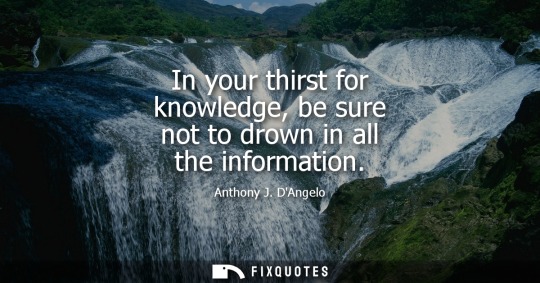
"In your thirst for knowledge, be sure not to drown in all the information"
- Anthony J. D'Angelo
#quotes#qotd#quoteoftheday#knowledgethirst#informationoverload#learningjourney#growthmindset#stayfocused
1 note
·
View note
Text
The Truth is Shared: How to Be More Open and Curious in a Chaotic World
Imagine your mind as a funnel that can only let a trickle of information pass through. The world around you is like a waterfall that constantly pours data into your funnel. How do you cope with the overwhelming pressure of too much information? How do you filter out the noise and focus on what matters? How do you make sense of the chaos and find meaning in the madness?
Continue reading Untitled
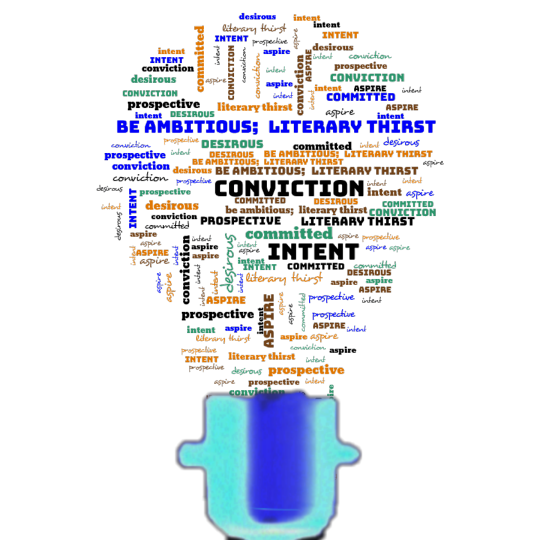
View On WordPress
0 notes
Text
The Pursuit of Truth: Unraveling the Mysteries of Knowledge
As human beings, we have an insatiable thirst for knowledge and the pursuit of truth. Throughout history, we have been driven to uncover the mysteries of the world and understand the complexities of the universe. We have been on a relentless search for answers to the questions that define our existence. This search for truth has led us to countless discoveries and breakthroughs, but it has also…

View On WordPress
#community#criticalthinking#discovery#evidence#experimentation#factcheck#fakeNews#informationoverload#integrity#knowledge#misinformation#pursuitoftruth#research#science#skepticism#transparency#trust#truthseeker#understanding#verify
1 note
·
View note
Text
Taking Another Look At Things With A Fresh View / Fresh Vision (Part Four)
We’re playing it like taking a look at the Solar Eclipse in Aries on Monday afternoon; we’re using a fresh view / fresh vision!
That energy is downloaded not over- loaded like information due to artificial intelligence stressing the masses out; that’s not how we’re living!
Getting over the hump is the mode / business per this HumpDay Extravaganza! but somebody will understand a brotha telling…
View On WordPress
#AnitaBaker#djmixes#ForeignerColdAsIce#FreshVision#HumpDayExtravaganza#informationoverload#poetry#SadeSmoothOperator
0 notes
Photo

Art Review: Annie Lapin: Contours of the Vast, at Shulamit Nazarian for Art & Cake (on view in Los Angeles through December 17) The hindquarters of a half-blue blue horse disappear into or perhaps emerge from within a gestural cloud of pigment billowing across a pastoral landscape; it is not drinking from the water to which it has been led. A latter-day, interfered with Fragonard, a compressed Corot, an accumulative Postmodern array of informational diversity and discretion. For all its compositional obfuscations, pictorial false flags, striated culs-de-sac, and trompe l’oeil winks, Tight Tied Tide (acrylic, oil, oil stick on linen, 2022) and indeed all the work in Annie Lapin’s enthusiastically busy current solo exhibition at Shulamit Nazarian are exceptionally clear in intention. That is: to replicate the cognitive position of a mind seeking pattern and order in the chaos of post-internet image overload. Read more here: https://artandcakela.com/2022/12/13/annie-lapin-contours-of-the-vast-at-shulamit-nazarian/ #art #painting #annielapin #arthistory #informationoverload #contoursofthevast #shulamit #artandcake #losangeles #gallery #abstraction #surrealism #cognition @artandcakela @annielapinstudio @shulamitnazarian (at Shulamit Nazarian) https://www.instagram.com/p/CmHxN8-vLWD/?igshid=NGJjMDIxMWI=
#art#painting#annielapin#arthistory#informationoverload#contoursofthevast#shulamit#artandcake#losangeles#gallery#abstraction#surrealism#cognition
1 note
·
View note
Text
Accommodating for Private Spaces in Outdoor or Public Spaces
Places for moments of privacy, quiet, prayer, reflection, pause.
Planning does not need to exclude considerations of mental health and spirituality in public space - we already consider physical health of people and environments in public space. We pretty much limit the mental experience in place to it’s pleasantness. Buildings rarely have these places either. 
A nook to safely find solitude in public places is mostly found in bathroom stalls which don’t even offer much of it. And they’re in appropriate for activities outside of their intention.
Someone having an anxiety attack or having a serious phone conversation, or stepping off of a crowded street to recollect themselves… or to read, to cry, to meditate or pray… they need a place to go that’s designated for this.
It’s like the concept of a breast-feeding pod or nap-room.
Public space can be tiring and inaccessible for people. Public space was likely much simpler just decades ago. Today, many things are electronic or advertisements which can cloud our minds and make days more information intensive than they already are. People leave for the suburbs for less speed than the cities. Our minds might not be adapted to everything required of it in todays public realm. A space to calm that’s designated and separate would balance out the chaos.
This breaks from embracing the visibility of public life. There is nothing wrong with that and it’s brings humans together which is so good. But, some things call for privacy. Lack of any privacy in public space might be what’s keeping people in their cars…………………………………
#publicspace#outdoor#spaces#urban#solitude#cars#mentalhealth#neurodiversity#informationoverload#minioasis#cryinpublic#cryinintheclub
0 notes